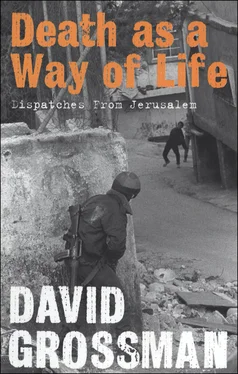David Grossman - Death as a Way of Life
Здесь есть возможность читать онлайн «David Grossman - Death as a Way of Life» весь текст электронной книги совершенно бесплатно (целиком полную версию без сокращений). В некоторых случаях можно слушать аудио, скачать через торрент в формате fb2 и присутствует краткое содержание. Год выпуска: 2013, Издательство: Bloomsbury Publishing, Жанр: Прочая документальная литература, на английском языке. Описание произведения, (предисловие) а так же отзывы посетителей доступны на портале библиотеки ЛибКат.
- Название:Death as a Way of Life
- Автор:
- Издательство:Bloomsbury Publishing
- Жанр:
- Год:2013
- ISBN:нет данных
- Рейтинг книги:5 / 5. Голосов: 1
-
Избранное:Добавить в избранное
- Отзывы:
-
Ваша оценка:
- 100
- 1
- 2
- 3
- 4
- 5
Death as a Way of Life: краткое содержание, описание и аннотация
Предлагаем к чтению аннотацию, описание, краткое содержание или предисловие (зависит от того, что написал сам автор книги «Death as a Way of Life»). Если вы не нашли необходимую информацию о книге — напишите в комментариях, мы постараемся отыскать её.
Death as a Way of Life — читать онлайн бесплатно полную книгу (весь текст) целиком
Ниже представлен текст книги, разбитый по страницам. Система сохранения места последней прочитанной страницы, позволяет с удобством читать онлайн бесплатно книгу «Death as a Way of Life», без необходимости каждый раз заново искать на чём Вы остановились. Поставьте закладку, и сможете в любой момент перейти на страницу, на которой закончили чтение.
Интервал:
Закладка:
How can it be that in recent months almost no clear voices have been raised on the left asking these questions? Can it be that we on the left are censoring ourselves, preventing this question from even being asked (with all good intention, so that we do not interfere with the process)? Perhaps, in our silence, we are collaborating with a historic debacle whose bitter fruits Israel will have to digest for generations. How can it be that the Peace Now movement isn’t sending out thousands of volunteers to intersections each day to make this other voice heard? Why isn’t it organizing mass demonstrations, precisely now, to exert pressure in the direction where it has always tried to lead? What has happened to the movement? What has happened to the government ministers from the pro-peace Meretz Party?
After all, huge pressure is being exerted on Yitzhak Rabin from the other direction, and its results can be seen in the street, in the public opinion surveys, and soon at the polls (its effect on Mr Rabin’s political and personal behavior is especially notable). Yet on the left — silence. True, the far-left Gush Shalom movement is asking such questions, but they are getting no response and no attention from the more moderate, and larger, part of the left. “How suddenly feeble you are, how have you ceased to give aid,” the poet Chaim Nachman Bialik chided the Zionist leadership in his 1931 poem “You Have Seen the Shortness of Your Reach.” Those lines are now addressed to us: as if we, the people of the word, of the book, of thought, become ineffectual when ideas turn to reality. As if we thought that from here on out, peace is the job of the doers rather than the thinkers. A kind of supernatural sense of security has overtaken us since Oslo, a dubious certainty that may well be based on nothing more than a naïve wishful hope that we have placed our pledge in the hands of a trustworthy emissary who will bring it to its destination, and that from that point forward, peace will prevail.
It is today, of all times, that a voice must come from the left, a voice with great force to pressure the government. The left has a unique talent for blazing a trail out of entrapment and immobility, away from petty squabbles with the Palestinians. There is no good reason to leave the field to the politicians. Especially not at this time. If we abandon it to them now, we will truly be worthy of the dismissive term “bleeding hearts.”
The bitter truth is that most of those who are today “leading” the process were not willing to enter into it until it was more or less forced upon them. Most of them did not read the map properly, did not discern the subterranean flow, the pressure building up with explosive force. After all, it was the long hesitation of the politicians of the right and the left, their denseness, their mental paralysis, their pandering to their voting public, that got us stuck in the disheartening situation we find ourselves in today. Why should we believe that all of a sudden, and in a much more delicate and complex situation, they would be able to reinvent themselves as more flexible and farsighted leaders? To what extent are they really able to change? Imagine a child who plays constantly with a puzzle made from a picture of a wolf. Suddenly the child is told to build, out of the same pieces, a picture of a dove. That, more or less, is the present dilemma of Prime Minister Rabin.
The question we need to ask is: When Rabin speaks (sincerely!) about wanting peace with the Palestinians, is he speaking of the most desirable, true peace for Israel in the long run, the peace for which the left has struggled all these years? The impression is growing stronger that Mr Rabin really means an expanded security arrangement that will fence the Palestinians into autonomous areas of confinement, surrounded and separated one from the other by a dense network of Israeli roads, roadblocks, and settlements.
The distance that Prime Minister Rabin has traveled up until now is worthy of admiration. Few leaders in the world or in Israel have the ability to do what he has done. Still, it is difficult to avoid the impression that belief in the use of force and the fighting instinct that are inherent in his character (an instinct that was most vital in other situations and times) are now preventing him from going the full distance. And this road has to be walked to its end. There’s no stopping before the destination is reached. If we don’t walk to the end, we will find ourselves walking back the way we came.
When it comes down to it, the peace process is, despite reports to the contrary, reversible. Many situations and procedures that were much more solid than this limping peace process were considered “irreversible,” their disappearance “impossible,” until they suddenly came to an end, and from then on the situation arranged itself in a different way around them. If Arafat becomes inactive, naturally or through a violent act; if Rabin continues to hesitate and to contend with Arafat instead of understanding that their fates are intertwined; if the Likud wins the elections; if the peace process is suspended for a few weeks after each major terrorist attack — if only one of these events happens (or any one of a myriad of others), there will be no peace. Not with the Palestinians, or as a result with the Syrians. The entire regional movement toward peace, problematic as it may be, will be frozen. But it won’t be cold here — within a short time Syria will begin to give us hell in Lebanon. The Intifada will renew itself in the strangled, despairing “territories,” this time with violence we have not yet seen.
In order to change this scenario fundamentally, we need to make a much more daring move. We need to shake off the repudiating, ungenerous, derisory attitude our representatives have taken toward the Palestinians during the negotiations. There’s no question that our position in the negotiations is much more comfortable — we have the “merchandise” and they need it; we are strong and they are weak. Error: it’s not so clear that we are only giving and they are only taking. Neither is it obvious that they need this peace more than we do. If that were really the case, Israel would not have been so quick to enter the process.
Isn’t it too late? When will we begin to hear voices that are at least as determined and aggressive as those on the right, demanding of Rabin that he not “defeat them” all that much? That we be much more generous, that we rise above our instinct to wrangle with them, that we remain committed to our original intentions? Or might it be that, deep in their hearts, those on the liberal left also want, even just a bit, to defeat the Palestinians and so “prove”—what? — the left’s loyalty? To whom?
After Rabin’s Assassination
November 1995
Prime Minister Yitzhak Rabin was assassinated on November 4, 1995, by a Jewish law student who acted alone. Yigal Amir succeeded in penetrating the security around Rabin — who was leaving a large peace rally in Tel Aviv-and fatally shot the prime minister at close range. The news of the assassination sent shock waves throughout Israel and around the world. The murder was strongly condemned by most parts of Israeli society, despite an already widespread opposition to the Rabin government’s policies. The traumatic event became a significant turning point in Israeli politics and the peace process.
I
Three bullets ended Yitzhak Rabin’s life, and all that his life symbolized. It’s as if the image of an entire generation shattered into tiny pieces and the era of the Sabra came to an end.
In all that he did, Rabin was a product of the forge of the elemental experiences that produced the Sabra, the new native Israeli. The biography of this man, who was so often called a traitor, passed through all the archetypical formative stations of the Israeli character — a prominent agricultural boarding school; training on a kibbutz combined with military service in the Palmach, the elite strike force of the nascent Jewish state; the Palmach’s first commander’s course; the army convoys that supplied besieged Jerusalem during the War of Independence of 1948; the battle for the Negev, Israel’s southern region, in that same war; command of the army in the Six-Day War; and more, throughout Israel’s history. This is the DNA of the Israeli identity.
Читать дальшеИнтервал:
Закладка:
Похожие книги на «Death as a Way of Life»
Представляем Вашему вниманию похожие книги на «Death as a Way of Life» списком для выбора. Мы отобрали схожую по названию и смыслу литературу в надежде предоставить читателям больше вариантов отыскать новые, интересные, ещё непрочитанные произведения.
Обсуждение, отзывы о книге «Death as a Way of Life» и просто собственные мнения читателей. Оставьте ваши комментарии, напишите, что Вы думаете о произведении, его смысле или главных героях. Укажите что конкретно понравилось, а что нет, и почему Вы так считаете.












